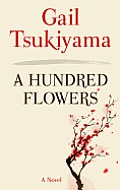 I’ve been meaning to get back to Gail Tsukiyama for some time, ever since I reviewed her The Samurai’s Garden. Too bad it took so long, but maybe it won’t be so long between next time.
I’ve been meaning to get back to Gail Tsukiyama for some time, ever since I reviewed her The Samurai’s Garden. Too bad it took so long, but maybe it won’t be so long between next time.
A Hundred Flowers has quite a different setting than Samurai’s Garden, both in place and time. We go from Japan to China, from the 30’s to the 50’s, from a pre-WWII world to Maoist China. In many respects, the setting is the same. Tsukiyama deals with life in a family in a small town. The struggles are no less gargantuan nor painful for all their limited space of geography and time. Kai Ying is an herbalist with a young boy, Tao. She’s married, but near the beginning of the book, her husband is dragged off to hard labor for answering a call to offer criticisms of the regime. It was obviously a ruse to lure the opposition out hiding, and Sheng is caught in the net. She and her father-in-law and sister-in-law are left to deal with raising the boy. Into their lives comes a young, homeless, pregnant girl–the child the result of a stepfather’s rape.

The story moves from one of the characters to the other, explaining with captivating and poignant detail how each one deals with the present in terms of his or her past and with the secrets each of them carries. Tsukiyama has an Austen-like simplicity to her prose that renders even the most tortuous plots clear and simple, yet leaves not an ounce of emotion out of it. What’s more she draws the details of place, of history, and of landscape so clearly that the reader is right there with every sight, smell, taste, and sound as the characters move through their stories.
It’s a story painted with a small brush, but exquisite and powerful in its effect. Very fine stuff.
